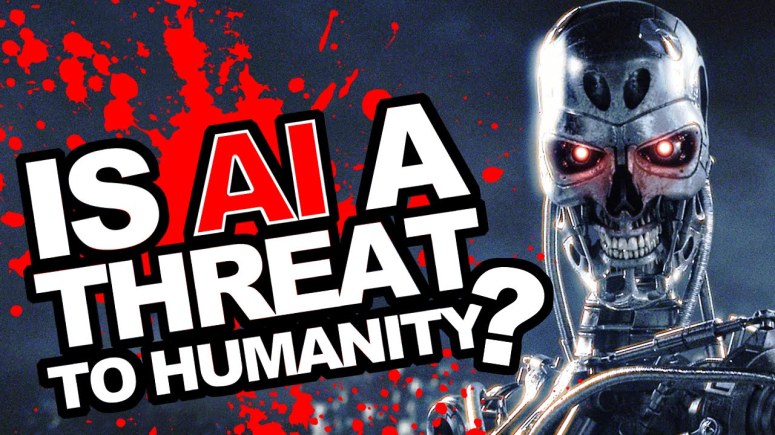You heard that right! The end is near. Looking for a place to Escape? HAHAHAAHAAA.😂
AI has the power to overhaul business models which can leave workers sidelined and companies struggling to work. Preparations need to be made for this!
BEWARE! THEY ARE COMING!! Goosebumps are ON in high capacity.
About 30 per cent of UK jobs are at high risk of being eradicated by AI by 2030, as per the estimations. The main question in everyone’s’ mind is:
Could artificial intelligence spell the end of humanity?
If you ask me, I would say at least for the next few decades, AI would definitely do good for Humanity. However, you all know the human mind and its trail of destruction. People who misuse AI can get many other lives into great trouble!
Could AI end humanity?
Technology naturally has its positives and negatives.
The astrophysicist Stephen Hawking has warned that artificial intelligence “could outsmart us all” and is calling for humans to establish colonies on other planets to avoid ultimately a “near-certainty” of technological catastrophe.
His dire predictions join recent warnings by several Silicon Valley tycoons about artificial intelligence even as many have piled more money into it.

By contrast, according to Moore’s Law, computers double their speed and memory capacity every 18 months. The risk is that computers develop intelligence and take over. Humans, who are limited by slow biological evolution, couldn’t compete, and would be superseded.
Google is making a push into “quantum computing” and has established an ethics committee to monitor the work of DeepMind, the artificial intelligence start-up it bought for £400m earlier in the year. Consumers are coming into increasing contact with “smart” machines, including flying drones and prototypes of self-driving cars.
Computers will soon become more intelligent than us. Some of the best brains in Silicon Valley are now trying to work out what happens next.
More must be done by the internet companies to counter a threat, but the difficulty is to do this without sacrificing freedom and privacy.
Is AI making young entrepreneurs fearful of losing jobs?
Many young talented entrepreneurs do feel that the impact of AI could make them lose jobs sooner. One among every ten employees feel, there would be a rise in the number of jobs available across markets, due to robots in the workplace.
Nearly half of the people feel the future role of machines in the workplace, would take up a large percentage of the workforce. About 20% are comfortable with machines and feel that it would not have an impact.
THE ROBOTS HAVEN’T just landed in the workplace—they’re expanding skills, moving up the corporate ladder, showing awesome productivity and retention rates, and increasingly shoving aside their human counterparts.
One multi-tasker bot, from Momentum Machines, can make (and flip) a gourmet hamburger in 10 seconds and could soon replace an entire McDonalds crew. A manufacturing device from Universal Robots doesn’t just solder, paint, screw, glue, and grasp—it builds new parts for itself on the fly when they wear out or bust. And just this week, Google won a patent to start building worker robots with personalities.
As intelligent machines begin their march on labor and become more sophisticated and specialized than first-generation cousins like Roomba or Siri, they have an outspoken champion in their corner: author and entrepreneur Martin Ford. In his new book, Rise of the Robots, he argues that AI and robotics will soon overhaul our economy.
AI takeover
A hypothetical scenario in which Artificial Intelligence (AI) becomes the dominant form of intelligence on Earth, with computers or robots effectively taking control of the planet away from the human race.
Possible scenarios include replacement of the entire human workforce, takeover by a superintelligent AI, and the popular notion of a robot uprising. Some public figures, such as Stephen Hawking and Elon Musk, have advocated research into precautionary measures to ensure future superintelligent machines remain under human control.
If a dominant superintelligent machine were to conclude that human survival is an unnecessary risk or a waste of resources, the result would be human extinction.
A superintelligent machine would not be motivated by the same emotional desire to collect power that often drives human beings. However, a machine could be motivated to take over the world as a rational means towards attaining its ultimate goals; taking over the world would both increase its access to resources, and would help to prevent other agents from thwarting the machine’s plans.
As an oversimplified example, a paperclip maximizer designed solely to create as many paperclips as possible would want to take over the world so that it can use all of the world’s resources to create as many paperclips as possible, and additionally so that it can prevent humans from shutting it down or using those resources on things other than paperclips.
Enjoy a decade or more with AI…
But as per our analysis, Doomsday is not far away!








Brilliant Article…… Absolutely true!!
LikeLiked by 1 person
Thank you, Jonathan!
LikeLike
Woahh!! Seems very scary. Let’s see what the future holds. 🙂
LikeLiked by 1 person